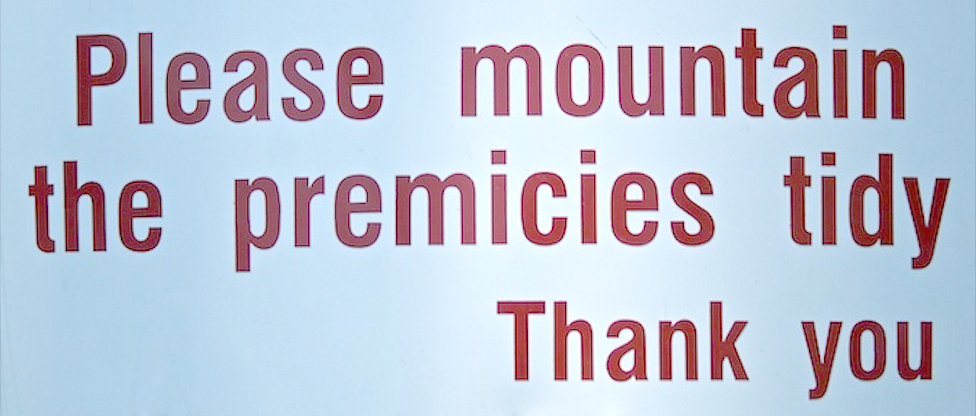
by Gary Bembridge on Google +
I carry a notebook with me wherever I travel to jot down thoughts, ideas and notes about things I see or do. The book is also designed to act as my conscience, as on the back page of the notebook, I have this list of 10 good blogging habits to remind me about what makes a good blogger:
Avoid being a travel generalist. Be a very specific niche travel expert.
To stand out in the crowded travel content and blog space, you need to be an expert and the ultimate resource on a very specific topic. There is an endless supply of broad and general travel content available to travellers. If you want to make an impression and build an audience, then focus a niche that you can “own” and become a recognised authority in.
Avoid talking to other bloggers. Ruthlessly focus on your target audience.
It is easy and tempting to write for the travel blogging community, as you will usually get a lot of comments and positive reinforcement. Unless travel bloggers are your target, ensure you stay focused on what your target audience of “real” travellers you are want. Find out what they like by engaging with them on your blog and in social media, and by doing surveys about what they need.
Avoid writing about topics off your nice. Stay on topic, and post those other thoughts somewhere appropriate instead.
Once you have a clear niche then ruthlessly stay on topic. You need to build a consistent voice and theme to satisfy your audience. If you do want to discuss other topics then look for alternative places to post them, like guest posts on other blogs on that topic or even have a separate blog on that topic.
Avoid sponsored posts. Have guests posts by expert bloggers in your niche.
The main way that travel brands work with bloggers is through placing sponsored posts and links on their blogs. Every blogger will receive a constant stream of requests from brands looking to build their links to improve their search engine performance. However, unless they are on topic then they are not what your audience is looking for. Instead run guest posts on topic from bloggers in your niche as your audience will appreciate those more.
Avoid reporting straight facts. Express opinions and tell personal stories.
There are plenty of well written, detailed and factual reports of every destination. This is not what travellers read blogs for. They are looking for articles from like minded travellers that share their interests to give real life, first hand and personal stories, reviews and recommendations.
Avoid bad spelling, grammar and accuracy errors. Write well, focusing on the fundamentals and basics.
People like reading well crafted articles. While you have enthusiasm and passion, your readers want something relevant, compelling and easy to read. You need an engaging opening that captures their interest. You need to keep and build their interest, and you need to reach a logical and clear conclusion. It needs to be crafted with good spelling and grammar. Readers are investing their time to read your work, you should respect the time they are investing in your work to provide them with well written articles.
Avoid generic photographs and images. Show yourself and the people you meet on your travels having fun.
If people wanted generic images of a destination then there are many high quality images available to look at elsewhere. Travellers visit blogs is to see real people having fun. You need to show images of yourself and other people enjoying and experiencing the destination, the place, the food or whatever you are writing about.
Avoid gushing about sponsored or funded trips. Stay honest, consistent and declare sponsorships.
Do not compromise your authenticity and honesty. People read blogs to get unbiased reports and reviews of destinations, places to stay and things to do. They are not looking for the optimistic marketing sell. Remember to write for your audience and not the tourist board, PR company or travel provider that has sponsored a trip. Retain your integrity and you will retain your reader’s trust. Be consistent, honest and always declare if some or all of your trip has been funded or sponsored.
Avoid spamming, hassling and begging your readers. Engage in conversations and encourage questions.
Travellers do not read blogs to find out what competition or top blogger competition you are trying to win. They come to read travel content about your niche. Avoid the temptation to promote and harass your readers to vote for you in competitions and awards. They do not care if you enter, nor do they care if you win. They do care if you give them outstanding content.
Avoid spreading yourself too thin across multiple social media platforms. Focus on where your audience is.
Most bloggers are active on many forms of digital platforms and social media. Just because you can be on everything, it does not mean you should be. Find out where your target audience is and what they use most. Focus on the most important one to them, and make a significant effort there. If you try and be on too many platforms you will end up having little effect among all the noise. Your target audience do not live their whole lives online, and you may find that you have more impact by connecting with them in the real world, through attending meet-ups, writing for specialist print magazines or joining clubs and associations for your niche.
Back to Travel Blogger University









